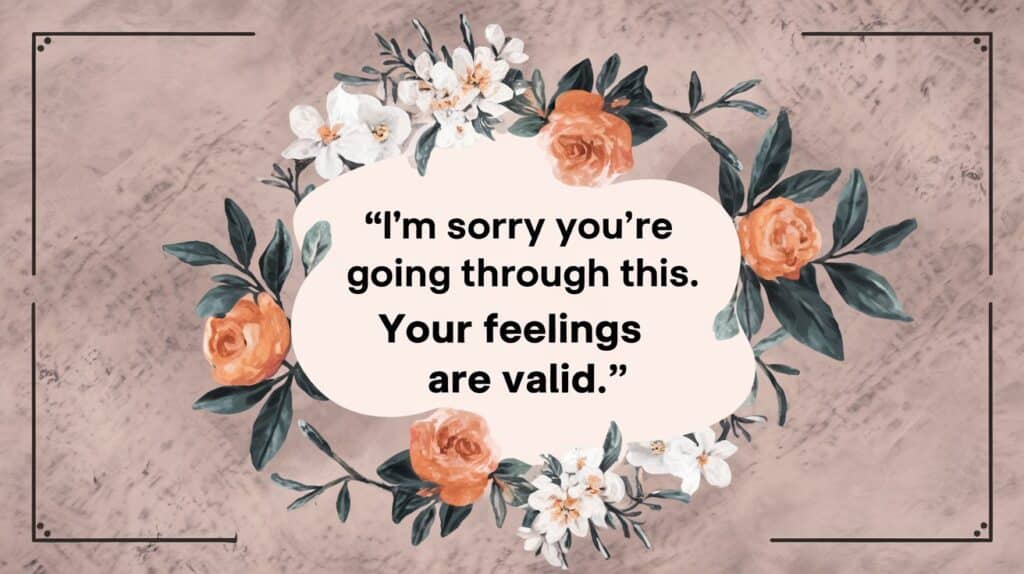When someone shares difficult news, responding with a sincere and thoughtful message can mean a lot. While “Sorry to Hear That” is a common phrase, there are many other ways to express empathy and support that feel more personal. In this article, we’ll explore 20 alternative phrases to “Sorry to Hear That,” along with examples to help you respond more meaningfully.
Whether it’s comforting a friend or offering condolences, knowing what to say besides “Sorry to Hear That” can make all the difference in connecting with others. Let’s dive into these alternatives to “Sorry to Hear That.”
What To Say Instead of “Sorry to Hear That”
Here’s a concise list of the 20 alternative ways to say “Sorry to hear that” :
- That must be really difficult for you.
- I’m here for you if you need anything.
- That’s really tough news. How are you holding up?
- My heart goes out to you during this challenging time.
- That sucks. Want to talk about it?
- I can’t imagine how you’re feeling, but I’m here to listen.
- What you’re going through is really tough. How can I support you?
- I’m sending you strength and positive thoughts.
- That’s a lot to deal with. Remember to be kind to yourself.
- I’m sorry you’re going through this. Your feelings are valid.
- I’m holding space for you during this difficult time.
- This situation really stinks. How can I lighten your load?
- I’m sending you a virtual hug. Take all the time you need.
- What you’re going through sounds incredibly challenging. I admire your strength.
- I’m sorry you’re dealing with this. Is there a small way I can make your day better?
- That’s a heavy burden to carry. Remember, it’s okay to put it down sometimes.
- I’m here to listen without judgment whenever you’re ready to talk.
- Your resilience is inspiring, even if it doesn’t feel that way right now.
- I’m sending you good vibes and practical support. Need any groceries?
- What you’re experiencing is really tough. Your feelings are completely valid.
1. “That must be really difficult for you.”

This phrase acknowledges the person’s struggle without making assumptions about their feelings. It opens the door for them to share more if they wish.
Example scenario (Email): Subject: Thinking of you
Dear Marcus,
I just read your email about the project setback. That must be really difficult for you, especially after all the hard work you’ve put in. If you need to talk or want help brainstorming solutions, I’m here.
Take care, Alicia
2. “I’m here for you if you need anything.”
This supportive language for difficult situations offers practical help while respecting the person’s autonomy.
Example scenario (Text message):
Friend: My car broke down, and the repair costs are astronomical.
😞 You: Oh no! I’m here for you if you need anything. Want me to give you a lift to work while it’s in the shop?
3. “That’s really tough news. How are you holding up?”
This combination acknowledges the situation and invites the person to share their feelings if they’re comfortable doing so.
Example scenario (In-person conversation):
Coworker: I just found out my position is being eliminated next month.
You: Wow, that’s really tough news. How are you holding up? If you want to grab coffee and talk about it, I’m free this afternoon.
4. “My heart goes out to you during this challenging time.”
This phrase offers a more formal yet heartfelt expression of sympathy, making it suitable for professional condolence phrases.
Example scenario (Condolence card): Dear Mrs. Thompson,
My heart goes out to you during this challenging time. Your husband was a remarkable man, and his contributions to our community will not be forgotten. Please know that you’re in my thoughts.
Sincerely, Dr. James Hawthorne
5. “That sucks. Want to talk about it?”

For close friends, sometimes a more informal sympathy statement can feel more authentic and comforting.
Example scenario (Phone call):
Friend: Hey, remember that job I interviewed for? I didn’t get it.
You: Aw man, that sucks. Want to talk about it? I’m free if you want to grab a beer and vent.
6. “I can’t imagine how you’re feeling, but I’m here to listen.”
This phrase acknowledges the uniqueness of the person’s experience while offering support.
Example scenario (Social media message):
Friend’s post: Just found out my childhood home burned down. Feeling lost.
Your comment: I can’t imagine how you’re feeling, but I’m here to listen if you need to talk. Sending you strength and support during this difficult time. 💜
7. “What you’re going through is really tough. How can I support you?”
This compassionate expression of concern validates the person’s experience and offers concrete help.
Example scenario (Work chat):
Teammate: Hi everyone, I’m going to be out for a while. My mom’s in the hospital.
You (private message): Hey Sarah, what you’re going through is really tough. How can I support you? I’m happy to take on some of your tasks if that would help.
8. “I’m sending you strength and positive thoughts.”
For those who appreciate more spiritual or energetic support, this phrase can be comforting.
Example scenario (Get well card): Dear Uncle Joe,
I heard about your upcoming surgery. I’m sending you strength and positive thoughts for a smooth procedure and quick recovery. Can’t wait to see you back on the golf course!
Love, Your favorite niece, Emma
9. “That’s a lot to deal with. Remember to be kind to yourself.”
This phrase acknowledges the difficulty while gently reminding the person to practice self-care.
Example scenario (Text message):
Friend: Between the divorce, moving, and starting a new job, I’m feeling overwhelmed.
You: That’s a lot to deal with. Remember to be kind to yourself. Want to join me for a relaxing yoga class this weekend?
10. “I’m sorry you’re going through this. Your feelings are valid.”

This combination offers sympathy while affirming the person’s emotional experience.
Example scenario (Support group meeting): Group member: I lost my job last week, and I’m feeling like a failure. You: I’m sorry you’re going through this. Your feelings are valid, and it’s okay to be upset. Losing a job is tough, but it doesn’t define your worth.
11. “I’m holding space for you during this difficult time.”
This phrase offers a sense of emotional presence without being intrusive.
Example scenario (Text message):
Friend: My dog of 15 years just passed away.
💔 You: Oh, Sarah. I’m holding space for you during this difficult time. Losing a fur baby is heartbreaking. If you want to share some favorite memories of Max, I’m here to listen.
12. “This situation really stinks. How can I lighten your load?”
Sometimes, a bit of informal sympathy paired with an offer of practical help can be just what someone needs.
Example scenario (In-person conversation):
Roommate: Ugh, I just found out I have to retake a class this summer. You: Man, that situation really stinks. How can I lighten your load? Want me to take over dish duty for a while so you can focus on studying?
13. “I’m sending you a virtual hug. Take all the time you need.”
This compassionate expression of concern works well for long-distance friendships or in professional settings where physical contact isn’t appropriate.
Example scenario (Email): Subject: Thinking of you
Dear Alex,
I heard about your recent loss. I’m sending you a virtual hug. Take all the time you need to process and grieve. We’ve got things covered here at work, so please don’t worry about a thing.
Warmly, Jamie
14. “What you’re going through sounds incredibly challenging. I admire your strength.”
This phrase acknowledges the difficulty while offering positive reinforcement during tough times.
Example scenario (Support group meeting):
Group member: I’ve been sober for a month now, but it’s been a daily struggle.
You: What you’re going through sounds incredibly challenging. I admire your strength. Each day you stay sober is a victory worth celebrating.
15. “I’m sorry you’re dealing with this. Is there a small way I can make your day better?”

This combines sympathy with a specific offer of help, making it easier for the person to accept support.
Example scenario (Text message):
Colleague: Heads up, I might be late to the meeting. My car won’t start. You: I’m sorry you’re dealing with this. Is there a small way I can make your day better? I could swing by with a coffee and give you a lift if that helps.
16. “That’s a heavy burden to carry. Remember, it’s okay to put it down sometimes.”
This supportive language for difficult situations acknowledges the struggle while gently encouraging self-care.
Example scenario (Phone call):
Friend: I’ve been caring for my sick parent 24/7, and I’m exhausted. You: That’s a heavy burden to carry. Remember, it’s okay to put it down sometimes. Have you considered looking into respite care options? You deserve a break too.
17. “I’m here to listen without judgment whenever you’re ready to talk.”
This phrase offers unconditional support while respecting the person’s pace and privacy.
Example scenario (Social media private message):
Friend’s post: Vague status about feeling lost and confused. Your message: Hey Chris, I noticed your post. I’m here to listen without judgment whenever you’re ready to talk. No pressure, just know I’m in your corner.
18. “Your resilience is inspiring, even if it doesn’t feel that way right now.”
This emotional support vocabulary acknowledges current struggles while highlighting the person’s inner strength.
Example scenario (Get well soon card): Dear Aunt Maria,
I heard about your recent health setback. Your resilience is inspiring, even if it doesn’t feel that way right now. I hope each day brings you closer to feeling like yourself again.
Love, Your favorite nephew, Diego
19. “I’m sending you good vibes and practical support. Need any groceries?”
This combines a spiritual/energetic offering with a tangible form of help.
Example scenario (Text message):
Friend: Just got diagnosed with mono. Looks like I’m out of commission for a while.
You: Oh no! I’m sending you good vibes and practical support. Need any groceries? I can drop off some soup and easy-to-prepare meals later today.
20. “What you’re experiencing is really tough. Your feelings are completely valid.”

This friendship-based consolation validates the person’s emotions without trying to fix or change them.
Example scenario (Coffee shop conversation):
Friend: I just found out my ex is getting married. I thought I was over it, but I feel so upset.
You: What you’re experiencing is really tough. Your feelings are completely valid. It’s okay to feel a mix of emotions, even if the relationship ended a while ago.
The Power of Empathy in Communication
As we’ve explored these alternatives, it’s clear that effective emotional support vocabulary goes beyond simple platitudes. By offering more nuanced and personalized responses, we can create deeper connections and provide more meaningful support.
Remember, the key to using these phrases effectively lies in situational empathy responses. Consider your relationship with the person, the nature of their difficulty, and the context of your interaction. What works for a close friend might not be appropriate for a professional acquaintance, so be mindful of relationship-appropriate consolation phrases.
Cultural variations of expressing sympathy are also important to keep in mind. What’s considered comforting in one culture might be seen as intrusive or inappropriate in another. When in doubt, err on the side of respect and privacy.
In professional settings, mastering workplace empathy expressions can greatly improve team dynamics and morale. A manager who can offer tone-sensitive sympathy alternatives during challenging projects or personal difficulties can foster a more supportive and productive work environment.
Beyond Words: Nonverbal Ways to Show Support
While we’ve focused on verbal expressions, it’s worth noting that nonverbal sympathy cues can be equally powerful. A warm hug (when appropriate), a comforting hand on the shoulder, or simply sitting in supportive silence can speak volumes.
Effective listening responses also play a crucial role in showing empathy. Nodding, maintaining eye contact, and using small verbal affirmations like “mm-hmm” or “I see” can encourage the person to share more if they wish.
Conclusion: Cultivating Compassion in Communication
As we wrap up, remember that while “Sorry to Hear That” is a common phrase, these diplomatic ways to acknowledge hardship are just starting points. The most important aspect of offering support is sincerity. Whether you choose “Sorry to Hear That” or another phrase, your genuine care and attention will always shine through, regardless of the exact words you choose.
By expanding your repertoire beyond “Sorry to Hear That” and practicing conversational techniques for expressing care, you’ll be better equipped to offer comfort in various situations. These skills not only help others but also deepen your own emotional intelligence and interpersonal relationships.
Ultimately, the goal is to create a culture of compassion, where we’re all a bit more attuned to each other’s struggles and ready to offer a kind word or listening ear. So, the next time someone shares difficult news, instead of just saying “Sorry to Hear That,” take a moment to thoughtfully choose your words. Your positive reinforcement could make all the difference in someone’s day—or even their life.
Remember, we’re all in this together. By cultivating empathy and knowing when to use “Sorry to Hear That” or another phrase, we can create a more supportive, understanding world, one conversation at a time.





